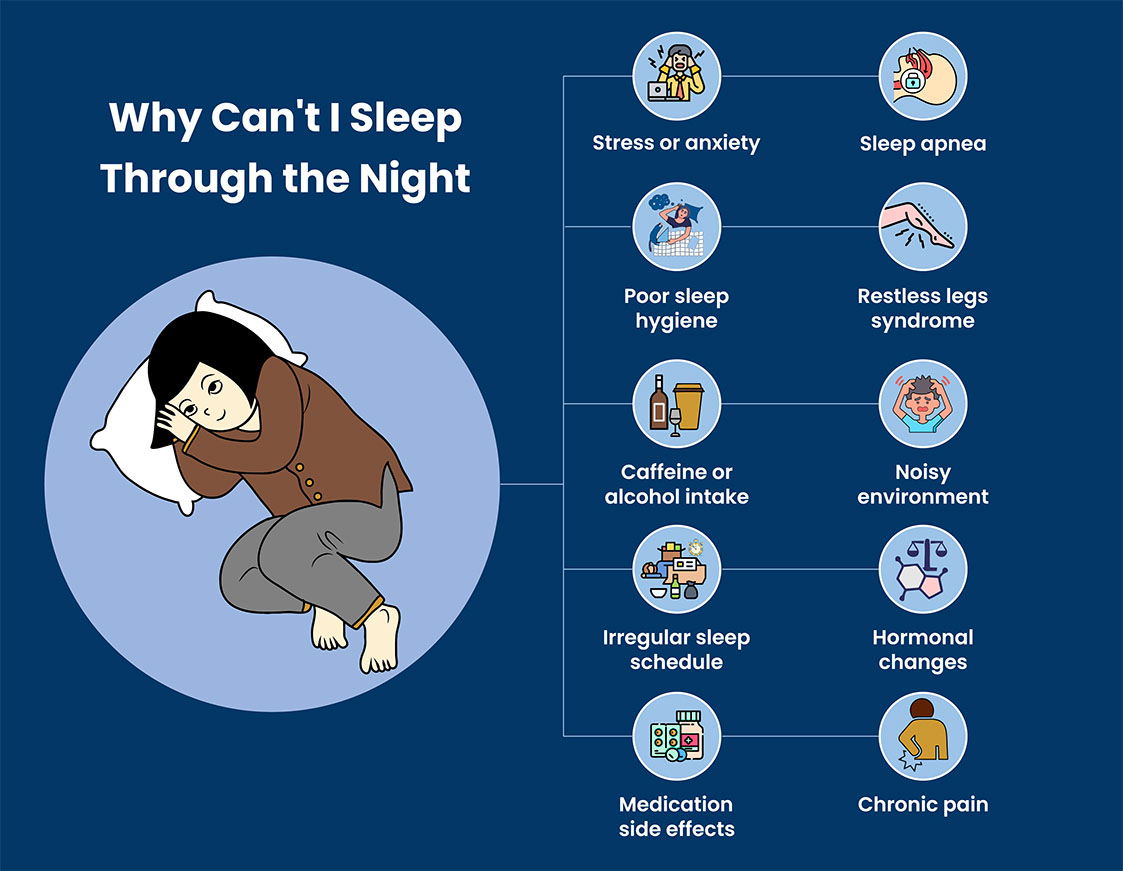Having trouble getting a good night's sleep? You're certainly not by yourself. Getting a full night of uninterrupted sleep has become difficult for many people in today's fast-paced world. Poor sleep can immediately impact your mood, energy, and general health, regardless of the cause—stress, anxiety, screen time, or an overactive mind that keeps you up at night. You may feel exhausted before the day has begun if you wake up several times, experience restlessness, or lie awake for hours.
The good news is that getting a good night's sleep is still possible. You can teach your body and mind to wind down, relax, and sleep through the night by making a few deliberate adjustments to your nightly routine and surroundings. This blog will walk you through easy yet efficient ways to naturally and consistently enhance the quality of your sleep. You're in the right place if you want to sleep soundly and wake up feeling rejuvenated. Starting tonight, let's investigate how to get a good night's sleep.
What Medical Conditions Affect Sleep?
A medical condition may be the hidden cause if you have trouble falling asleep, staying asleep, or waking up feeling exhausted. Numerous physical and mental health conditions can directly affect the length and quality of sleep. One of the most important steps to improving your sleep and general well-being is realizing how your health and sleep are related. The following list includes some of the most prevalent illnesses that can interfere with sleep:
1. Insomnia
One of the most prevalent sleep disorders, insomnia can either be a symptom of another problem or a condition in and of itself. An inability to fall asleep, stay asleep, or wake up too early without feeling rested is a symptom of insomnia.
2. Sleep Apnea
A dangerous condition known as sleep apnea causes breathing to stop and start repeatedly while you're asleep. It frequently results in loud snoring and frequent nighttime awakenings, which hinder the ability to get deep, restful sleep. Even after what seems like a full night's sleep, many people with sleep apnea experience extreme daytime fatigue.
3. Chronic Pain
Finding a comfortable sleeping position can be difficult for people with conditions like arthritis, fibromyalgia, migraines, and back pain, which can result in restless nights. Frequent nighttime awakenings may also result from the pain.
4. Depression and Anxiety
Sleep is significantly influenced by mental health. Sleep patterns are frequently altered in depressed people; some sleep too little, while others sleep too much. Restlessness, racing thoughts, and trouble falling or staying asleep are all symptoms of anxiety.
5. Restless Legs Syndrome (RLS)
Restless Legs Syndrome is a neurological condition typically brought on by uncomfortable sensations that result in an insatiable desire to move the legs. It usually worsens at night, making it harder to unwind and sleep.
6. Heart Disease and High Blood Pressure
Sleep can be affected by cardiovascular problems in some ways. Breathlessness, chest pain, and other sleep-disturbing symptoms are common in people with heart issues. Sleep disturbances are another side effect of some medications used to treat these conditions.
7. Asthma and Respiratory Disorders
People with asthma or chronic obstructive pulmonary disease (COPD) frequently experience breathing difficulties, particularly at night. Shortness of breath, wheezing, and coughing at night can disrupt and degrade sleep.
8. Gastroesophageal Reflux Disease (GERD)
Acid reflux disease, or GERD, can cause heartburn and discomfort when you lie down, especially after eating. This may make it harder to fall asleep and result in frequent awakenings during the night.
9. Thyroid Disorders
Hyperthyroidism, or an overactive thyroid, can make it difficult to fall asleep by causing anxiety, restlessness, and an elevated heart rate. Hypothyroidism, or an underactive thyroid, can cause excessive drowsiness but not always good sleep.
10. Neurological Disorders
The body's normal sleep-wake cycle is frequently impacted by illnesses like Parkinson's and Alzheimer's. These disorders can cause insomnia, frequent night awakenings, or even fragmented sleep.

17 Tips to Sleep Through the Night Peacefully
Getting enough hours of sleep isn't enough to ensure a restful night's sleep; you also need to get quality sleep that rejuvenates you. These practical suggestions will help you get better sleep naturally and reliably if you wake up a lot or have trouble falling back asleep:
1. Stick to a Sleep Schedule
You can better control your internal clock by going to bed and waking up at the same time every day, even on the weekends. Following a regular sleep schedule trains your body to anticipate rest at the same time every night, which facilitates falling and staying asleep.
2. Create a Relaxing Nighttime Routine
Your body and mind can relax more easily if you have a regular, peaceful routine before bed. Try reading, taking a warm bath, doing deep breathing exercises, or relaxing music. Stay away from stressful or overly stimulating activities right before bed.
3. Limit Screen Time Before Bed
The hormone that regulates sleep, melatonin, may be hampered by the blue light from TVs, phones, and tablets. At least 30 to 60 minutes before bed, try to avoid using screens. Instead, choose low-light, silent pursuits like meditation or journaling.
4. Keep Your Bedroom Sleep-Friendly
Create a calm sleeping environment in your bedroom. Make sure the space is quiet, dark, and cool. If necessary, use eye masks, white noise generators, or blackout curtains. Invest in pillows and a cozy mattress to promote sound sleep.
5. Watch What You Eat and Drink
Steer clear of nicotine, caffeine, and large meals right before bed because they can all make it difficult to fall and stay asleep. Limit alcohol consumption as well; while it may initially make you drowsy, it frequently results in fragmented sleep later in the evening.
6. Get Some Sun During the Day
Exposure to natural light aids in circadian rhythm regulation. Make an effort to spend some time outside during the day, particularly in the morning. Deeper sleep at night can also result from regular physical activity during the day.
7. Manage Stress and Anxiety
Worry and racing thoughts are common sleep-blockers. Before going to bed, try mindfulness, meditation, or easy breathing techniques to help you relax. Maintaining a "worry journal"—writing down your ideas and putting them away for the evening—can also be beneficial.
8. Avoid Naps Late in the Day
Long or late-afternoon naps can disrupt your sleep at night, but short power naps can be beneficial. Aim for 20 to 30 minutes earlier in the day if you must take a nap.
9. Use Your Bed Only for Sleep
Instead of associating your bed with eating, watching TV, or browsing through your phone, teach your brain to associate it with sleeping. Over time, this enhances the quality of sleep by reinforcing sound sleep habits.
10. Use Sleep Supplements (Wisely)
You can promote deeper rest and control your sleep cycle by taking natural sleep aids like valerian root, magnesium, or melatonin. Before incorporating any supplements into your regimen, especially if you're taking other medications, always get medical advice.
11. Drink Chamomile Tea Before Bed
The soothing, mild sedative properties of chamomile tea are well-known. You can naturally fall asleep by relaxing your nervous system with a warm cup 30 to 45 minutes before bed.
12. Decrease Room Temperature
A cool environment is ideal for your body's sleep. Keep your bedroom between 60°F and 67°F (15°C and 19°C). A cooler room may lessen night sweats or overheating that can disrupt sleep by helping your body tell you when it's time to relax.
13. Take a Bath with Epsom Salt Before Bed
An excellent method to relax your body and ease tense muscles is to take a warm bath with Epsom salts. Epsom salts' magnesium content may also aid in reducing stress and encouraging drowsiness. For optimal effects, try taking a bath 60 to 90 minutes before bed.
14. Use a Sound Machine
You can block out distracting background noise that could wake you up by using white noise or natural sounds. Consistent audio is produced by a sound machine, which facilitates falling and remaining asleep.
15. Fall Asleep Listening to an Audiobook
An audiobook with a soothing narration can help divert your attention from worrying or overanalyzing. To gently lull you to sleep, pick something calm and gentle—nothing too dramatic or exciting!
16. Use a Sleep Mask
The production of melatonin can be disrupted by even minute amounts of light. If you're light-sensitive or live in a city, a cozy sleep mask can help block out all light, making it easier to get a good night's sleep.
17. Use Earplugs
If you constantly wake up due to noise from your neighbors, traffic, or a snoring partner, try soft, comfortable earplugs. They can lessen the likelihood of frequent awakenings and help create a calm sleeping environment.
When to See A Doctor?
Even though sporadic insomnia is common, persistent sleep problems should not be disregarded. It might be time to get professional assistance if you've tried to improve your sleeping patterns but are still having trouble falling asleep regularly, waking up frequently, or feeling worn out during the day.
The following are some obvious indicators that you ought to consult a physician or sleep specialist:
- You frequently wake up several times during the night and find it difficult to fall back asleep.
- Even after what seems like a full night's sleep, you wake up feeling exhausted or unrefreshed.
- You may have sleep apnea if you gasp, stop breathing, or snore loudly while you're asleep, or if your partner observes these symptoms.
- To get through the night, you often turn to supplements or sleep aids.
- You suffer from persistent insomnia that persists for longer than a few weeks.
- Your everyday life, job, mood, or ability to concentrate are all being impacted by your daytime drowsiness.
- You have strange sleep-related behaviors, such as restless movements, vivid nightmares, or sleepwalking.
A physician can assist in determining whether your inability to sleep is due to an underlying illness, such as sleep apnea, restless legs syndrome, anxiety, depression, or a hormonal imbalance. A correct diagnosis and course of treatment can often significantly improve both your general health and the quality of your sleep.
Final Thoughts
If you adopt a consistent, mindful approach to your nighttime routine, sleeping soundly through the night is not just a pipe dream; it is a reality. Better sleep begins with understanding your body and providing it with the care it needs, from identifying any medical conditions that may be preventing you from sleeping to making minor but effective lifestyle changes.
You can achieve deeper, uninterrupted sleep with each tip you use, whether it's establishing a peaceful bedtime routine, limiting screen time, drinking chamomile tea, or changing your sleeping environment. It's not just about sleep; it's about your long-term health and well-being. If your sleep problems continue despite your best efforts, don't be afraid to consult a doctor.













